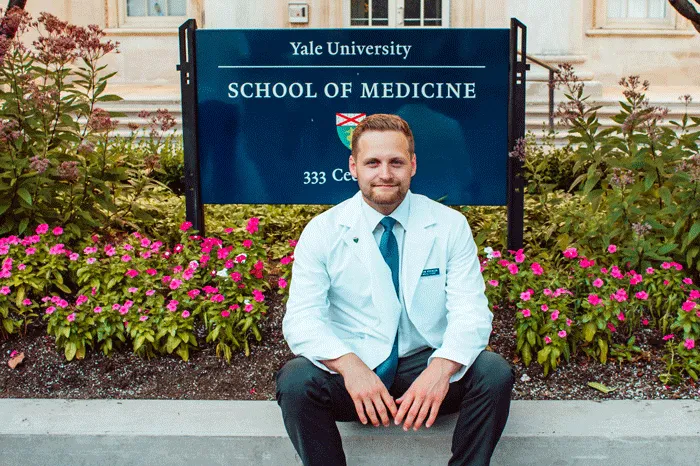
There is nothing typical about the path Brendan Adkinson ’16 has taken since graduating from Marietta College — and he wouldn’t change a thing about it.
For nearly eight years, Adkinson has lived in New Haven, Connecticut, conducting research and attending medical school at Yale. But when you take a closer look, the former two-sport athlete is doing so much more.
“My faith has informed my central vision in life since the time I was in college, but the exact details of how everything would play out weren’t always clear. It’s been an exciting journey,” said Adkinson, who earned a Bachelor of Science in Biochemistry and Neuroscience and a Bachelor of Arts in Spanish. “I was fortunate to have so many professors at Marietta who were personally invested in helping me think through my goals.”
After graduating, Adkinson secured a three-year research position at Yale and subsequently gained admission into their MD-PhD program. The MD-PhD trajectory combines medical school and graduate studies to create physician-scientists.
“The program helps bridge the gap between medical research and clinical practice. In theory, it allows us to apply scientific discoveries to improve patient care while simultaneously harnessing clinical insights to inform our research,” Adkinson added.
He started the program in 2019 and completed his first two years of medical school before transitioning to four years of working on a PhD in Neuroscience. He will complete his PhD in 2025 and then return to medical school for his final two years.
“It can be tough to watch the classmates you started medical school with become physicians and move on while you continue training,” Adkinson said. “But for me, the extended training time has given me opportunities to think through and identify what really matters most to me in life.”
It has also allowed the Bellevue, Ohio, native to tap into his entrepreneurial side. For example, his research interests are focused on the intersection of artificial intelligence (AI), mental health, and rural health.
“I build machine learning models that use MRI scans of patients’ brains to predict their psychiatric symptoms,” said Adkinson, who was awarded a $120,000 grant from the National Institute on Minority Health and Health Disparities. “That study focuses on how healthcare algorithms may be biased, or perform more poorly — for example, a lower likelihood of choosing the correct treatment — in patient populations that are underrepresented in research.”
Adkinson’s focus on rural healthcare and underrepresented populations comes as no surprise to Dr. Alicia Doerflinger, who was one of his advisors at Marietta.“I worked with Brendan to create a student-designed major that is basically our Neuroscience major we offer now,” said Doerflinger, Psychology Department Chair. “It was a pleasure to work with Brendan, who came to me and said he wanted to do a capstone project that looked at healthcare access for migrant workers in Ohio.”Adkinson has also founded a startup company that uses AI to make admissions consulting accessible to everyone. He said it is something that would have benefited him coming out of high school.
“Our team has received nearly $50,000 in funding from VentureWell and the Tsai Center for Innovative Thinking at Yale,” said Adkinson, who was the first Neuroscience graduate from MC.
Opportunities through his research will take him to London, England, Seoul, South Korea, and rural India this year. He’s also an advisor to a nonprofit focused on health and education access in rural Ghana.
In the fall, Adkinson received the Maria Leonard Fellowship from Alpha Lambda Delta. ALD offers 28 scholarships annually ranging from $2,000 to $7,000 that are designed to offset the cost of graduate school.
When asked what advice he’d offer to Marietta students, Adkinson said, “Something that is sometimes underappreciated is embracing the hard work as an undergraduate. I feel like your hard work pays off more when you are younger because people are willing to invest in you, and they perceive to see something in you.
“Also, feel free to mention that for everything I’ve applied to, I got rejected from more than half of them,” he added. “I don’t want the Marietta students to get the wrong idea, and I am always happy to chat with them if they reach out.”
With so many moving parts to his life and career, Adkinson said his future is still up in the air.“
My long-term goals aren’t fully decided, but I really enjoy building things. I would love to establish a new research division within an academic institution that nucleates collaborations in rural research across disciplines and also invests in satellite research sites within resource-limited rural communities,” he said.